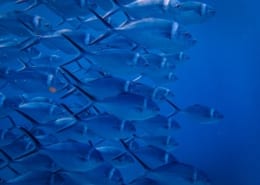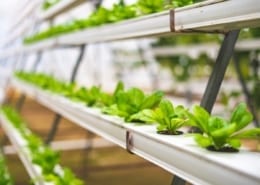Marine aquaculture or ‘mariculture’ refers to a sub-category of aquaculture that deals specifically with marine animals. And with marine fish stocks across the world increasingly under pressure, there is ample opportunity and potential profitability for those with knowledge in this area. This includes those working in aquaculture operations, or at businesses that have aquatic animals.
The Certificate of Marine Aquaculture is an online program that will teach you about the fundamentals of mariculture to set up a successful and sustainable business.
In this professional development course, you will explore general mariculture production systems, and the factors, including diet, feeding and health issues, that need to be considered when choosing marine species for an aquaculture business.
You will also learn about the commercial production of finfish, crustaceans, molluscs, seaweeds and aquatic algae; the role of marine invertebrates in mariculture; and the pharmaceutical uses of marine organisms.
On completion of this course, you will learn to plan and manage the farming of a wide variety of marine life to enhance your aquaculture career, or even start your own business!
Course Structure
Mariculture - Marine Aquaculture
Unit 1 – Aquaculture Production Systems
- What is Mariculture
- Purposes of mariculture
- Classification of culture systems
- Extensive production (Ep)
- Intensive production (Ip)
- Classifications based on system input
- Open systems (off-shore and near-shore)
- Semi-closed systems
- Closed systems (on shore)
- Common culture method for each marine category
- Cage culture
- Cage design: Floating flexible, floating rigid, semi-submersible and submersible
- Hanging Culture: Raft and suspended trays
- Long-line culture
- Vertical or rack culture
- Bottom culture: Bottom sowing and cultch lines
- Stone, stake culture, net and umbrella culture
- Semi-enclosed: flow through tanks
- Closed Systems (CAS): Recirculating, raceways, and inland ponds
Unit 2 – Starting a Marine Aquaculture (Mariculture) Business
- Economics of establishing and running a farm
- The need for a feasibility study
- Economic analysis
- Requisites for establishing a business
- Factors to consider
- Industry competition
- Availability of leased and quotas
- Economy of scale
- Site selection and water quality
- Properties of salt water
- Water quality management
- Environmental impacts.
- Food chain problems
- Using wild broodstock
- Nutrient pollution
- Chemical pollution
- Spreading pathogens
- Escapes
- Habitat effects
- Managing environmental impacts
- Improving the genetic quality of fish
- Biotechnology
Unit 3 – Choosing a Species
- Choosing a marketable species
- What information is available?
- Understand your competition before selecting a species
- Common mariculture species
- Selection criteria
- Climate
- Water resource
- Finance
- Scale of operation
- Market demand and access
- Availability of animals
- Risk considerations
- Product markets
- Product, price and promotion
Unit 4 – Finfish
- Industry overview
- Types of mariculture
- Broodstock/seed supply
- Growout
- Commonly cultured species
- Tuna
- Atlantic salmon
- Steelhead Salmon (Saltwater rainbow trout)
- Yellowtail (Japanese Amberjack)
- Sea Bass
- Gilt-head sea bream
- Water quality management
Unit 5 – Crustaceans
- Industry overview
- Types of mariculture
- Broodstock/seed supply
- Growout
- Commonly cultivated species
- Penaeid shrimp (prawn)
- Graspid Crabs
- Lobster
Unit 6 – Molluscs and Echinoderms
- Industry overview – molluscs
- Types of bivalve culture
- Broodstock/seed supply
- Growout
- Abalone
- Oysters
- Cultured mussels
- Scallops
- Giant clams
- Industry overview – echinoderms
- Types of mariculture
- Breedstock/seed supply
- Growout
- Commonly cultivated species
- Sea Urchins
- Sea cucumbers
Unit 7 – Seaweeds and Aquatic Algae
- Industry overview
- Types of mariculture
- Broodstock/seed supply
- Land-based cultivation systems
- Tanks
- Ponds
- Sea cultivation
- Farming methods
- Vegetative cultivation
- Cultivation involving a reproductive cycle
- Commonly cultivated species
- Laminaria japonica
- Porphyra sp.
- Undaria sp.
- Eucheuma seaweed
Unit 8 – Pharmaceuticals
- Pharmaceutical value of marine organisms
- Examples of species used in marine biotechnology
- Sea urchin
- Sea cucumber
- Marine sponges
- Seaweeds (algae)
Unit 9 – Diet Formulation and Feeding
- Feeding strategies
- Nil input
- Water fertilisation
- Supplementary feeding
- Complete diet feeding
- Fish feed
- Feeding and feed components
- Environmental problems associated with fish feeding
- Mycotoxins in feeds
- Aflatoxins
- Ochratoxins
- Fumonisins
- Trichothecenes
- Managing mycotoxins in prepared feeds
Unit 10 – Health Management – Diseases and Parasites
- Causes of disease
- Health management and mitigation strategies
- Treatment of diseases and parasites
- General principles
- Common signs that fish are unhealthy
- Common diseases of finfish
- Emerging pathogens
- Common diseases of crustaceans
- Common diseases of bivalves (molluscs)
Unit 11 – Harvest and Post Harvest Handling
- Examples of product forms
- Harvest/post harvest handling of selected species
Study Hours
Estimated duration 50 hours
Course Delivery and Start
Start anytime, self-paced and 100% online
Assessment
Assessment will be comprised of written exercises, including short-answer questions, reflective tasks, short reports and/or projects. There are no examinations or due dates for assessment. As a result, you can complete training in your own time and at your own pace with the assistance of unlimited tutor support.
Approval and Recognition
Australian Online Courses Pty Ltd is an approved and recognised member of IARC. The IARC is an International association that recognises quality and excellence in tertiary education providers.
Testimonials
Graduation
A Certificate of Attainment and Statement of Results will be issued upon successful completion of this course.
How to Enrol
Enrolment Form – Employment Services and Rehabilitation Providers
Enrol via Live Chat (Business Hours)
Enrol via Telephone 1300 76 2221 (Business Hours)
Payment Options
Visa, Mastercard, BPAY, Bank Transfer and Afterpay. Please allow 1-2 Business days for processing for BPAY, Bank Transfer and Afterpay.
Course FAQs
Why Choose Australian Online Courses?
- Professional development that is widely recognised and respected;
- Improve your employment opportunities;
- Study online, anywhere via our elearning system;
- High-quality professional development programs written by industry experts;
- All course materials provided online – no textbooks to buy;
- Unlimited tutor support via email;
- We offer twelve (12) months’ access, with extensions available upon application (fees apply);
- Course may be tax deductible; see your tax advisor.
Are there any entry requirements or pre-requisites?
There are no course or subject pre-requisites for entry into our programs. However, our professional development programs are generally intended for people over the age of 18. In some circumstances, enrolments from younger people may be considered. Please complete the AOC Parent Guardian Consent Form prior to enrolling and submit here.
Are there any computer requirements?
To study online with Australian Online Courses you will need a computer (desktop PC/laptop) running a current/updated operating system with reliable high-speed internet access. You will need to use the Google Chrome browser to access your course.
When can I start this course?
You can start within 60 minutes during business hours when you enrol and pay in full with a credit card!
Credit card: Within 60 mins during business hours.
BPAY: Within 1-2 working days.
Afterpay: Within 1-2 working days
Internet Banking: Within 1-2 working days.
Cheque/Money Order: Upon receipt of mailed cheque.
How is this course delivered?
This course is delivered online via our easy-to-navigate Learning Management System (LMS), where you will discover interactive online learning/written content, resources and assessment.
Do I need to attend classes or undertake any work placements?
No. All courses are delivered online via our LMS and there are no work placement requirements in this course.
What support can I expect from Australian Online Courses?
Unlimited tutor support is available throughout your studies via email only during business hours Monday to Friday. Our Administrative team are available Monday to Friday via email, live chat and telephone.
I am an international student. Can I enrol into this course?
Yes! We accept enrolments from individuals both within Australia and internationally; location is no barrier to entry into our programs.
Career Pathways
Future growth
Strong
Unemployment
Low
Professional Development for:-
- Aquaculture Production Roles
- Mariculture Operator









